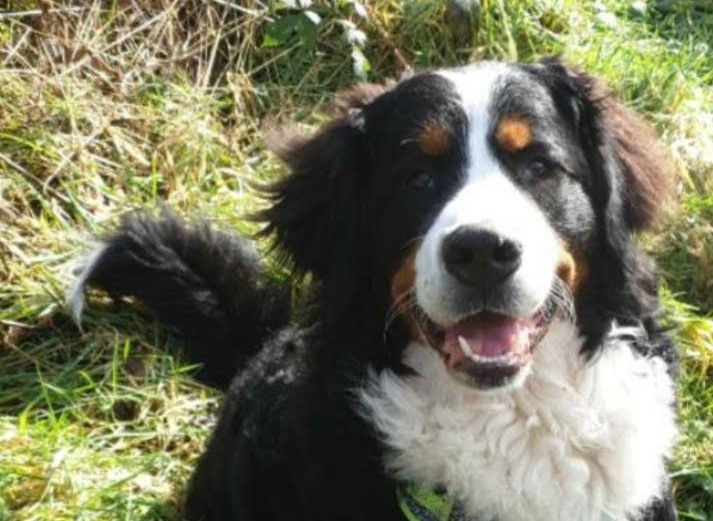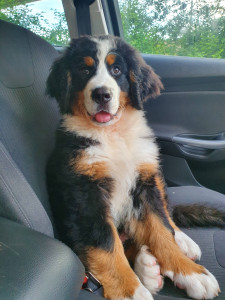Do you need help?

A dog called Loki got lucky when his sharp-eyed owner spotted early symptoms of deadly twisted stomach syndrome – and rushed him through a blizzard to get help.
Bernese Mountain dog Loki – named after the God of Mischief character in the Marvel comics – suddenly fell ill while a snowstorm was raging outside.
Seeing that he was panting, agitated and trying but failing to be sick, his owner Laura Watton correctly deduced that he could be suffering from a twisted stomach.
The condition, which is sadly fatal for many dogs, requires immediate vets’ attention and Laura’s quick thinking undoubtedly helped save Loki’s life.
She rang Vets Now to report three-year-old Loki’s symptoms and then set off for our seven-days-a-week pet emergency clinic in Belfast from her home in nearby Ligoniel.
But what would normally be a straightforward 20-minute journey turned into an hour-long ordeal after she had to dig her car out of snow and navigate treacherous ice-strewn roads.
And all the while poor Loki’s condition was worsening, with him yelping and moaning in pain.
Laura said: “It was a terrifying journey but I knew I had to make it for Loki’s sake.
“As I got nearer he became motionless in the car and I honestly thought we were going to lose him but I pressed on and got him to the clinic.
“When I was a child my neighbour’s dog had an issue with a twisted stomach – so the minute Loki got the same symptoms I was fearing the worst.
“He went outside and just lay underneath the kids’ trampoline as though he was seeking protection and I knew then something was seriously wrong.”
Twisted stomach – known officially as gastric dilatation and volvulus syndrome – happens when a dog’s stomach fills with gas and turns in on itself, threatening the blood supply returning to the heart … rapidly leading to shock and, if uncorrected, death.
It mainly occurs in large, deep-chested breeds, though it can also occur in dogs of any shape and size, and there is no single cause for it. Instead, there are a number of known risk factors which include a genetic history of the disease (the single most important factor), eating rapidly, being very lean, or having a nervous predisposition.
Led by principal vet Sasha Burns Fraser, our team went to work on Loki straightaway.
Sasha said: “Loki’s heart was racing, his pulse was weak. He was really struggling and in so much pain.
“We put two catheters in his legs to get fluids into him while we did an x-ray, which confirmed what we and Laura suspected, showing a very big twist in the stomach and guts full of gas.
“We passed a catheter through the abdominal wall into the stomach to release the gas to help restore normal breathing and blood flow.
 “In surgery, we untwisted Loki’s stomach and repositioned it. We also had to remove a portion of the stomach which had died due to the blood supply being compromised.”
“In surgery, we untwisted Loki’s stomach and repositioned it. We also had to remove a portion of the stomach which had died due to the blood supply being compromised.”
“Then we fastened it to the inner abdominal wall to help prevent any repeat.
“Very sadly, this syndrome is so dangerous that it’s not uncommon for a dog to be dead on arrival for treatment.
“But, if you can get a dog with this condition into surgery quickly enough, then survival chances improve markedly.
“So, it’s no exaggeration to say that every minute matters in these cases and Laura deserves a lot of credit for acting so quickly here.”
At 11.30pm, two hours and 15 minutes after he’d arrived, Loki was out of surgery and at the beginning of an anxious 10-day path to recovery.
Laura collected him from Vets Now and took him to her local vets in Newtonabbey for further monitoring and recuperation.
Laura said: “For the first five days, it was really touch and go and he was on heavy painkillers and antibiotics. But after that, he started making quick progress and after a week and a half he was ready to get his stitches out and was pretty much back to normal, much to our relief.”
Larger-than-life Loki is now back to charging around the garden and carrying out his favourite trick: running through people’s legs with his tail wagging wildly.
“It was an exhausting time for all of us,” Laura said. “Loki is such a big part of our family that I felt really drained for a couple of weeks afterwards, partly because the journey through the snow was so traumatic.
“Sasha and the nursing team saved Loki’s life just when we thought all was lost and we will always be incredibly grateful to them for being there exactly when we needed them, and for their kindness and expert care.”
Sasha said: “Loki is such a big, fluffy, cuddly dog – he made an immediate impression on all of us and we could see just how much he meant to Laura and her family.
“We’re so pleased for them that Loki has come through all this and made such a full recovery.
“And if your dog is trying to vomit but can’t, or has breathing problems, or is agitated or lethargic, it’s possible they have a twisted stomach and it really is essential to seek vet advice immediately, as Laura did.”
